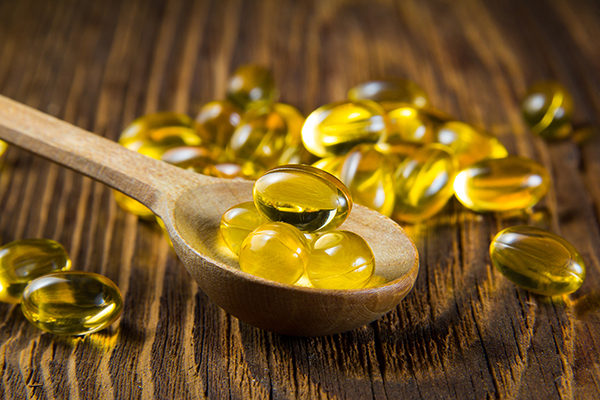



| By Dr. Ronald Hoffman

When it comes to the debate over fish oil’s heart benefits, medical opinion keeps shifting more than lead changes in a Duke/North Carolina March Madness basketball showdown. But the tide has turned with a couple of recent studies.
“Omega-3 fish oil supplements linked with lower cardiovascular disease risk” – ScienceDaily. People who received omega-3 fish oil supplements in randomized clinical trials had lower risks of heart attack and other cardiovascular disease (CVD) events compared with those who were given placebo.
And a new study suggests that even plant-based Omega-3s, from sources like walnuts and flaxseed, may improve heart health.
I’m a veteran of the Omega 3 Wars. I was in med school in the 80s when excitement mounted over fish oil’s potential to dramatically curtail cardiovascular risk. This was spawned by the observation that Inuit Eskimos were virtually free of heart attacks despite eating a diet high in animal protein and fat—mostly from Arctic fish and marine mammals rich in EPA and DHA.
And it made sense. Fish oil has blood-thinning effects, preventing platelets from sticking together. It’s also anti-inflammatory, curbing the impetus to plaque formation. It may be vasodilating, helping to lower blood pressure and promote circulation. EPA lowers triglycerides, thought to be even more important than cholesterol as a determinant of cardiovascular risk. And Omega 3s may even have anti-arrhythmic benefits, although that remains controversial.
In 2009, a survey revealed that, “72 percent of the nation’s cardiologists recommend dietary supplements to their patients, and more than half (57 percent) take supplements themselves, with the most popular being multivitamins, omega-3/fish oils and vitamin C.”
But a handful of negative trials in recent years dampened enthusiasm over fish oil supplements. Pieces critical of fish oil supplements appeared in the Journal of the American Medical Association (JAMA) in 2018, made 2015 headlines in The New York Times, and even a cardiologist recanted his previous advice to patients in an opinion piece in The Philadelphia Inquirer.
But, just as fish oil supplements were proclaimed worthless, a study called REDUCE-IT demonstrated that Amarin Pharmaceuticals’ concentrated EPA drug, Vascepa, curtailed cardiovascular events by an astounding 25%!
Amarin stock soared on the announcement; Slick drug ads began to appear in print and on TV, touting the advantages of pharmaceutical-grade EPA in Vascepa over store-bought brands of fish oil.
Amarin’s website highlights “The Vascepa Difference”, impugning non-prescription fish oil pills: “Dietary supplements such as common fish oils and Omega-3s are not FDA-approved. It’s important to know that they are not intended nor proven safe or effective to treat patients with medical conditions such as very high triglycerides.”
WebMD parrots this distinction, resurrecting the worn shibboleth: “The FDA doesn’t regulate supplements as closely as prescriptions. So the amount of omega-3s listed on the label may be higher than what you actually get. In addition, supplements may not be pure omega-3s and may contain other ingredients or contaminants.”
Admittedly, credit is due to Amarin for undertaking the expensive and time-consuming process of validating and earning coveted FDA approval for their concentrated, high-dose form of EPA. They’ve earned the right to push back against supplement makers’ attempts to draft on their intellectual property to promote ordinary fish oil pills.
But how to reconcile the contradiction that prescription fish oil works while over-the-counter supplements are valueless?
I decried this paradoxical state of affairs in an article entitled, “Fish oil declared worthless for heart disease . . . until it became a profitable drug!” I wrote:
“Double-standard much?? When fish oil is sold in health food stores it’s worthless, the barb of snarky headlines. But when it’s packaged as a profitable prescription drug—well now that’s news we can use!”
The new study addresses the conundrum. The authors report that the heart benefits of fish oil supplements may have been previously obscured by several factors:
So, bottom line: balance and rationality has been restored to the Omega 3-Heart story. Take prescription fish oil if you desire and if your doctor is on board, especially if your generous medication benefits plan slashes its hefty price tag ($380 for a two month supply) to a modest co-pay.
But if you take regular fish oil supplements, like I do myself and like most of my audience, you’re not at any disadvantage when it comes to heart protection.
And you may reap additional mood, brain-protective, pregnancy, eye, exercise-recovery and anti-inflammatory dividends from the DHA that’s a natural accompaniment of the EPA in supplements—but not pharmaceutical concentrates like Vascepa.
Though we think of declining estrogen as the hallmark of menopause, it's actually common for…

Up to 12 percent of Americans have ulcers at some point in life. Peptic ulcers…
Gallbladder disease is a modern illness. An estimated 20 million Americans have gallbladder disease. The…

There’s more to GI health than whether or not to take an acid-blocker. All too…

In the latest attempt to remove “stigma” from medical terminology, liver specialists have come up…

Q: My husband’s high sensitivity C-reactive protein (hs-CRP) is 1.62 and his homocysteine is 13.1. If…

Banish the Bloat: Leyla Weighs In with Tips and Insights

Our virtual voicemail is open 24/7, so there's no need to wait to submit your questions for Dr. Hoffman. Leave a message, and you may hear your question featured on the Intelligent Medicine radio program!